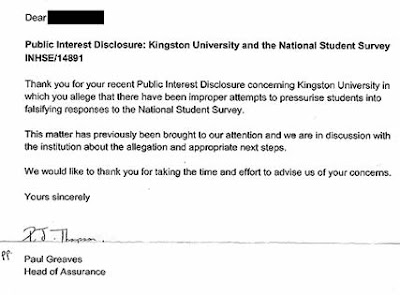
Purpose – The purpose of this article is to examine how the labour process of further education lecturers has changed as a result of legislative reforms introduced in the early 1990s.
The authors: Kim Mather, University of Wolverhampton Business School, Wolverhampton, UK
Les Worrall, University of Wolverhampton Business School, Wolverhampton, UK
Roger Seifert, Keele University, Keele, UK
Personnel Review, 36, 1, 2007
...The application of market-based reforms in the FE sector, as in other parts of the public sector, has resulted in the intensification and extensification of work effort for lecturers on the front line. There are fewer lecturers who are working harder, working for longer and teaching more students: we have shown that they are struggling to cope with these increased workload demands. Our view is that this is a direct consequence of the particular nature of and, particularly, the ideological underpinning to the reform process that has sought to stimulate a state proxy for the capital accumulation imperative, through the introduction of competitive and market pressures in FE provision. Applying Braverman's logic in a highly labour intensive sector such as FE, we might expect to see labour management strategies designed to secure more for less from lecturing staff. Evidence of work intensification is clearly apparent in the three colleges we have examined and this echoes the findings drawn from research undertaken elsewhere in the FE sector and the public sector more generally.
Workers' responses suggest that there is resistance both at individual and collective level to these downward pressures though resistance does not seem to have been sufficiently strong to prevent the reported changes from occurring. Braverman (1974) was clear that under capitalism, work intensification increases the rate of exploitation of workers. He was also explicit about the long-term tendential nature of deskilling and the degradation of labour suggesting that short-term acts of resistance will be ineffective over the longer term. Lecturers in these colleges have been dispossessed of key job controls, which, when allied to trends in work intensification reported here, points to a degree of transformation in aspects of their labour process that may be directly linked to broader developments in the political economy of the Further Education sector specifically and the public sector more generally.
The research has revealed a number of key points all of which are consistent with Braverman's thesis. There is clear evidence that the public sector in the UK has changed dramatically with managerialist and consumerist notions having assumed ascendancy over those of the professions. The rise of a new managerial class in the public sector with its own rhetoric of performance management, targets, indicators, value for money, quality, productivity and flexibility has also been shown to have a world-view that has little in common with workers at the chalk face. We have provided clear evidence of deskilling in the form of the replacement of less flexible and more expensive full-time staff with more flexible and less expensive “things” (as one senior manager called them) and the increasing casualisation of working conditions.
We have also provided clear evidence of the redesign of work practices that have moved the lecturing profession away from a craft system of production where lecturers, as subject specialists, had more autonomy over what was taught, towards a factory system of production where standardisation in the form of modularisation has taken place and subject specialists are expected to teach outside their specialism simply to fill up their timetables in order to keep costs down. This we see as evidence that cost reduction criteria assume ascendancy over quality criteria despite the rhetoric of quality that currently pervades academic institutions in the UK. We argue that labour process theory has provided a powerful framework for the analysis of recent changes in the public sector as characterised by the growth of managerialism and the rise of the “new public management”. Despite the rhetoric of much contemporary management practice (“our employees are our greatest asset”), Taylorism and Fordism would seem to be “alive and well” in the UK public sector. It is unfortunate that many of the workers in the sector are not in a similar state of “good physical and psychological health”.





